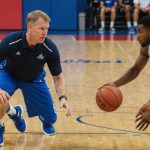In the realm of sports training, the athletic performance scene has experienced a revolution with the emergence of biofeedback techniques. This process utilizes technology to provide athletes with real-time feedback about their physiological responses. It allows them to monitor their heartbeat, blood pressure, body temperature, muscle tension, and brain waves. The intent is to help athletes take control of these involuntary responses to enhance their performance. The scope of this article covers how athletes can leverage biofeedback to improve muscle coordination, focusing on neurofeedback, performance, and training.
Biofeedback: The Game-Changer
Biofeedback has emerged as a game-changer in sports training. It provides athletes with valuable data about their physiological responses, enabling them to adjust their training and performance in real-time. Whether you are a professional athlete or a fitness enthusiast, understanding how your body reacts to different stimuli can be a catalyst for improving your overall performance.
Topic to read : What specific exercises can improve tendon strength for powerlifters?
The process involves attaching sensors to your body that gather data about your physiological responses. This information is then fed back to you through a computer monitor or other devices. You can observe your heart rate, breathing patterns, skin temperature, muscle activity, and even brain waves. This immediate feedback empowers you to make instantaneous tweaks to your physical and mental strategies, thereby enhancing your performance and muscle coordination.
Neurofeedback: Training the Brain
Neurofeedback, a subset of biofeedback, is a training process that teaches the brain to change its electrical activity. This technique utilizes a device known as an NFT (neurofeedback training device) that records brain wave patterns and provides visual or auditory feedback. Based on this feedback, athletes can train their brain to function more efficiently, leading to improved focus, enhanced learning ability, and better muscle control.
Also to see : What are the most effective strategies for managing delayed onset muscle soreness?
The brain is the control center of the body. By training it to operate more efficiently, athletes can enhance their performance. For instance, a sprinter can learn to reduce anxiety and maintain focus at the starting line, a basketball player can manage the stress of a penalty shot, and a tennis player can increase concentration during long matches. The possibilities with neurofeedback are virtually endless.
Group Training: A Collective Effort
Biofeedback is not just for individual training. It can also be employed in a group setting to enhance overall team performance. Group biofeedback training helps to harmonize team efforts, fostering better communication, coordination, and mutual understanding among team members.
When applied correctly, biofeedback can play a significant role in synchronizing a team’s performance. For instance, in sports like football or basketball, where timing and coordination are vital, biofeedback can help athletes synchronize their efforts, resulting in a more cohesive performance.
Biofeedback and Muscle Coordination
Muscle coordination is paramount in any sport. Whether you’re hitting a baseball, kicking a soccer ball, or running a marathon, your muscle coordination plays a crucial role in your performance. Biofeedback offers a distinctive approach to improving muscle coordination.
Through biofeedback, athletes get real-time data about their muscle activity. This information helps them understand which muscles are overworking and which ones are underworking. By adjusting their movements based on this feedback, athletes can achieve better muscle coordination, leading to improved performance.
The Role of Mental Focus in Sports Performance
Mental focus plays a vital role in sports performance. Whether it’s maintaining concentration during a long tennis match or staying calm under pressure during a penalty shoot-out, mental focus can be the difference between winning and losing.
Biofeedback, particularly neurofeedback, can help athletes improve their mental focus. By providing real-time data about brain activity, athletes can learn to control their mental processes, leading to better focus, reduced anxiety, and improved performance.
In conclusion, biofeedback is a powerful tool that can help athletes push their boundaries and achieve their peak performance. Through neurofeedback, group training, and focus on muscle coordination and mental focus, biofeedback offers an innovative approach to sports training, enabling athletes of all levels to gain a competitive edge.
Biofeedback Devices: Essential Tools for Training
Biofeedback devices have become quintessential tools in sports training and performance optimization. They allow athletes to measure and monitor a range of physiological responses including heart rate, temperature, muscle tension, and brain wave activity. Notably, these devices offer real-time feedback, enabling athletes to adjust their performance instantaneously based on the data they receive.
One of the prominent devices used for biofeedback training is the EMG (Electromyography) biofeedback device. It is particularly beneficial in enhancing muscle activation and coordination. EMG biofeedback measures muscle tension and provides information about the level of muscular activity. This data can be extremely useful for athletes as they can adjust their training regimen to optimize muscle use and prevent injuries.
Another notable biofeedback device is the HRV (Heart Rate Variability) biofeedback device. This technology provides feedback on heart rate variability, helping athletes understand their body’s stress responses and recovery state. It can also help athletes improve their reaction time, a critical factor in many sports.
It’s worth noting that biofeedback devices are extensively researched and their effectiveness is backed by numerous studies. According to PubMed and Google Scholar, many control group experiments have demonstrated the benefits of biofeedback training in enhancing sports performance.
Neurofeedback Therapy: A Pathway to Peak Performance
Neurofeedback therapy, a specific subset of biofeedback, focuses on training the brain to optimize its functioning. The brain, being the control center of the body, plays a vital role in athletic performance. Optimizing brain function can significantly improve an athlete’s concentration, control, and coordination.
Neurofeedback therapy involves using a Neurofeedback Training Device (NFT) that records brain wave patterns and provides real-time visual or auditory feedback. With this feedback, athletes can learn to control their mental processes, leading to better focus, reduced anxiety, and ultimately, enhanced performance.
For instance, neurofeedback therapy can help a marathon runner maintain focus and manage fatigue during a race. It can also help a football player handle the stress of a penalty shoot-out, maintaining composure under pressure. The therapy can even assist a tennis player in maintaining concentration during a long match.
The potential benefits of neurofeedback therapy in sports performance are broad and varied. As more athletes and trainers understand its advantages, it’s likely to become an integral part of sports training, helping athletes reach their peak performance.
Conclusion: Biofeedback – A Revolution in Sports Training
In conclusion, biofeedback has revolutionized the way athletes train and perform. It provides real-time data about an athlete’s physiological responses, empowering them to take control and optimize their performance. Biofeedback devices, such as EMG and HRV biofeedback devices, are critical tools in achieving this.
Neurofeedback therapy, a subset of biofeedback, opens up a pathway to peak performance by allowing athletes to train their brain to function more efficiently. This enhances their focus, reduces anxiety, and improves overall performance.
In an era where marginal gains can make a significant difference in sports performance, biofeedback offers a cutting-edge approach to training. It enables athletes to understand their bodies better, make real-time adjustments, and push their boundaries in pursuit of excellence. Whether in individual or group training, biofeedback is set to play an increasingly influential role in shaping the future of sports training.


















